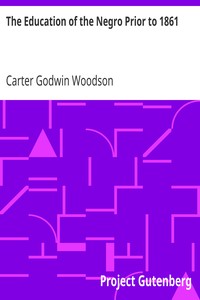| Author |
Woodson, Carter Godwin, 1875-1950 |
| Title |
The Education of the Negro Prior to 1861
A History of the Education of the Colored People of the United States from the Beginning of Slavery to the Civil War
|
| Credits |
Produced by Suzanne Shell, Josephine Paoluccci and the Online Distributed Proofreading Team
|
| Summary |
"The Education of the Negro Prior to 1861" by Carter Godwin Woodson is a historical account written in the early 20th century. The work explores the comprehensive history of the education of African Americans from the onset of slavery up to the Civil War, analyzing the various challenges and advancements they experienced in their quest for knowledge. At the start of the narrative, Woodson introduces the complex landscape of education for Negroes in the ante-bellum period. He outlines two distinct phases in this history: the initial period when some slaveholders recognized the economic benefits of educating their slaves, and a later period marked by a backlash against such education driven by fear of potential uprisings. Woodson highlights the roles of different societal groups, including sympathetic masters, religious missionaries, and reformers, who endeavored to improve the educational opportunities for slaves and free black individuals, often in defiance of repressive laws. In contrast, he also details the increasingly reactionary measures that sought to restrict and prohibit access to education for African Americans as the institution of slavery evolved. The opening sets a scholarly tone while advocating for a more profound recognition of the intellectual capabilities and rights of the Negro in the broader context of American society. (This is an automatically generated summary.)
|
| Language |
English |
| LoC Class |
LC: Education: Special aspects of education
|
| Subject |
African Americans -- Education
|
| Category |
Text |
| EBook-No. |
11089 |
| Release Date |
Feb 1, 2004 |
| Most Recently Updated |
Feb 15, 2004 |
| Copyright Status |
Public domain in the USA. |
| Downloads |
382 downloads in the last 30 days. |
|
Project Gutenberg eBooks are always free!
|

